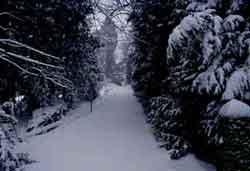Kristal Kennedy
 It's dark outside; I can see over your body, to the window and the cracks in the blinds. From the back you look like any other man -- your hair cropped short, a straight line across your neck. Light from a forgotten hallway fixture blends white across the carpet. I blink hard and focus, stare at a framed picture: three men, no four, all grins, in shorts, hugging each other, saying Cheers to the camera. A frat pack, I think.
It's dark outside; I can see over your body, to the window and the cracks in the blinds. From the back you look like any other man -- your hair cropped short, a straight line across your neck. Light from a forgotten hallway fixture blends white across the carpet. I blink hard and focus, stare at a framed picture: three men, no four, all grins, in shorts, hugging each other, saying Cheers to the camera. A frat pack, I think.
I close my eyes, do a self-test, but only for a moment can I see your brown hair, the wrinkling of your neck. Instead I see your taillights, round shapes, glowing red.
In a moment, when the air stirs, I catch leftover whiffs of scent in my hair and on my skin, and decide that there should have been music, sad, mournful music -- a jukebox of tears -- a neon-lit quarter-taking howling machine. We improvised because it was just lonely us, no machine in the corner, no records, no band, no fanfare. We were conductors of our own music: thump-crashing shins and glass tables, hollow grating backbones and wallpapered walls. The result was a symphony, an orchestrated production tapping tear-dropping beats. Our endnote is this -- my pants in a corner, my weather-proof boots near the door, fleece jacket lying puffy and bodiless before I put it on. Outside, descending your apartment's wooden steps, I look at new snow, its glowing whiteness under the street lamps.
Maneuvering through the velvety cold and its freezer smell, I think how I would have liked it, if guys still had to come to the door like they used to. Like back when boys oiled their hair and put on their only Sunday shirt and came to the door, stood there at the girl's door, sweaty hands in their pockets, twitching all nervous and embarrassed. While me, with my head over a basin of water, I'm washing the sweat of heat off my face, standing there half-bent in a stiff pastel dress, pinching my cheeks for a rosy glow. I would have liked it back then, back when beaux knocked at girls' doors.
Instead I'm sneaking away, driving two-lane roads, passing acre lots, racing barbed wire fences in a snow-floured dented 4x4. And I'd like to blame it on the booze, blame it on the neon lights, the music, The Proofs, the good humor. I'd like to blame it on the weather, the night, say it was cloaked force. But the truth is, some crazy woman who looks like me decides last night that she likes the way your shirt hangs, the way it sways: like a hammock in a country backyard, the way it folds, the way it flutters in the breeze. And this woman likes the light, the way it shadows your face, makes your body bright; so she buys you a beer.
This same crazy woman must get herself together now because the snowplow is coming with its flashing lights and snow-tumbling shovel and doesn't the driver know that he should drive a little slower so the crazy woman in the 4x4 has time to clear the laughing tears from her eyes so she can see where she's going in all this whiteness? She's sure he doesn't care and sure she's going to be run over, so she pulls into someone's driveway and stops, exhaust clouds billowing around her, floating, this way and that way like a halo of geriatric kites. Then here comes the snowplow, tilling snow and air, wrecking her cloud puffs, deserting that crazy woman and driving away.
Then I move on too, roaring the engine, uncleaning the freshly plowed road, and suddenly a little girl inside me begins knocking on my chest. Who you gonna tell? Who you gonna tell?
By rank it's Val first of course, my friend of ten years. She is Central, the hub. I tell her, she tells Melanie, who tells Courtney who tells everybody else.
Whattcha gonna say? The little girl with the tiny fist knocks again. Should I tell Val it was cold and I wanted to get warm so I slept with some guy I don't know? But then she'll laugh and get that crinkle she gets in the corner of her eyes when she doesn't understand something and she'll say, Excuse me? You did what? And then I will have to explain and I don't know what I'll say, which leaves me confused and wondering and practicing: It was the light. It was his shirt. It was his shoulders, his arms, the noise, the bartender, the day of the week, it was something I don't know he made me do it.